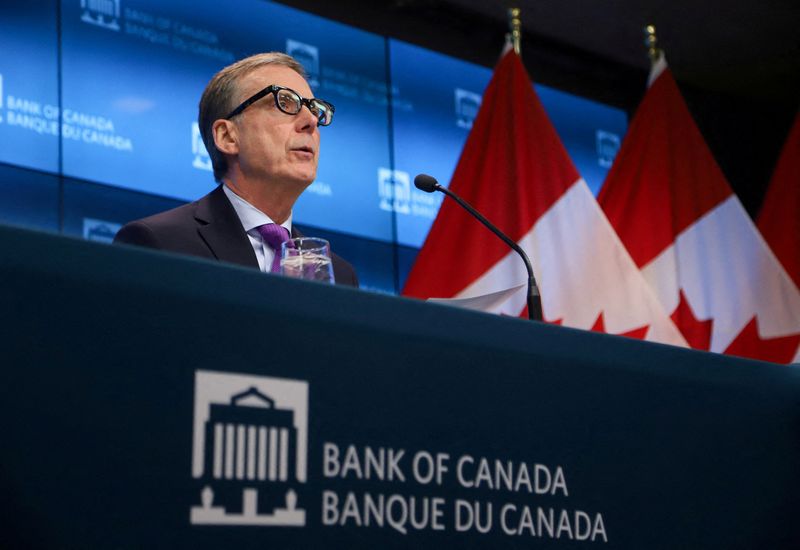By Steve Scherer and Promit Mukherjee
OTTAWA, Jan 24 (Reuters) - The Bank of Canada (BoC) held its key overnight rate at 5% on Wednesday and said while underlying inflation was still a concern, the bank's focus is shifting to when to cut borrowing costs rather than whether to hike again.
The BoC governing council has held rates steady at four consecutive policy meetings after last hiking in July. Annual inflation in December accelerated to 3.4%, still higher than the central bank's 2% target but below a June 2022 peak of 8.1%.
"Governing Council's discussion of monetary policy is shifting from whether our policy rate is restrictive enough to restore price stability, to how long it needs to stay at the current level," Governor Tiff Macklem said in remarks.
Money markets are expecting a cut of 25 basis points in June after having pushed back bets for a cut in April following the release of December annual inflation data..
The BoC dropped language included in previous policy statements saying it was "prepared to raise the policy rate further if needed." However, in his opening remarks to reporters Macklem said the bank had not ruled out further rate hikes.
"If new developments push inflation higher, we may still need to raise rates," Macklem said. "If the economy evolves broadly in line with the projection we published today, I expect future discussions will be about how long we maintain the policy rate at 5%," he said.
Macklem had previously indicated rates were most likely at their peak but Wednesday's remarks were the first time he had brought up the potential timing of a rate cut.
A Reuters poll of 34 economists published last week forecast the BoC would hold rates on Wednesday and at its next meeting in March. Twelve analysts said the first rate cut since March 2020 would come in April, while about two-thirds expect one in June or later.
The BoC trimmed its outlook for growth and was slightly more optimistic about when inflation would come down to its 2% target, according to new forecasts also published on Wednesday.
The BoC sees growth weak in the first quarter and then picking up gradually. Inflation is projected to stay around 3% through the first half of 2024, easing to 2.5% in the second half, and returning to target sometime in 2025. In October, the BoC said it would hit its target by the end of 2025.
Shelter prices and food are keeping inflation high, and wages are still rising between 4% and 5%, Macklem said, adding that "further declines in inflation are likely to be gradual and uneven" and the BoC "is concerned about the persistence of underlying inflation".
Before easing rates, "we want to see inflationary pressures continue to ease and clear downward momentum in underlying inflation," Macklem said.
In the third quarter of last year, the economy contracted, and the BoC's quarterly business survey showed that firms have fewer orders than a year ago. An increasing number of firms expect a recession over the next 12 months.

